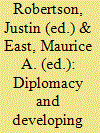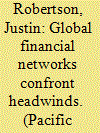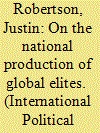|
|
|
Sort Order |
|
|
|
Items / Page
|
|
|
|
|
|
|
| Srl | Item |
| 1 |
ID:
060001


|
|
|
|
|
| Publication |
Abingdon, Routledge, 2005.
|
| Description |
xi, 280p.
|
| Standard Number |
0714654035
|
|
|
|
|
|
|
|
|
|
|
|
Copies: C:1/I:0,R:0,Q:0
Circulation
| Accession# | Call# | Current Location | Status | Policy | Location |
| 049345 | 327.09172409049/ROB 049345 | Main | On Shelf | General | |
|
|
|
|
| 2 |
ID:
177672


|
|
|
|
|
| Summary/Abstract |
China’s economic ties with the British Virgin Islands (BVI) exemplified global finance beyond national borders in the post-cold war period. This relationship now serves as an example of global finance’s more tenuous foundations as social and political forces coalesce against the offshore economy. The article establishes the defining conflict as the tension between national/global regulations and an Asian-headquartered network that coordinates offshore financial flows. The analysis outlines how the global network connecting Asia to the Caribbean has receded. Several factors are decisive. First, global and national forces are now aligned. Because global regulatory change is predicated on minimum standards only, domestic commitment to global regulatory norms is critical. Domestic commitment to the new international taxation regime is variable but a key development is that many large emerging markets have committed to the effort. China has forcefully imposed new restrictions on the offshore economy, including closing down routes for capital exit. One result is that the BVI–China relationship, after deep financial interconnections, is on a downward trajectory. The larger pattern than deserves further analysis is how action by China—along with India and Indonesia—suggests that substantive reform of the global offshore economy, led by Asian actors, is possible.
|
|
|
|
|
|
|
|
|
|
|
|
|
|
|
|
| 3 |
ID:
134379


|
|
|
|
|
| Summary/Abstract |
A small but dominant group of global financial elites has been trained in France. These elites hold powerful positions in the global derivatives industry, most prominently in the field of equity derivatives. The specialized French role is both a cause and a consequence of the intensifying use of derivatives, one of the major developments in global financial capitalism. Equity derivatives have spread from France to Europe, and now to Asia, with London and Hong Kong serving as control centers. Three factors are key in explaining the French niche in global derivatives. First, particular characteristics of national systems, in this case highly advanced French mathematics education, can spawn market dominance in specific areas of the global economy. Second, French networks, founded on shared experiences in French schools and French banks, are both relatively closed and highly portable across national borders. Third, new actors in developed and developing regions of the global economy are driving demand for derivatives products that are designed by French trained elites in French banks and especially in global banks. The global financial crisis has neither derailed the demand for derivatives nor, consequently, the role French engineering schools play in educating some of the top global financial practitioners.
|
|
|
|
|
|
|
|
|
|
|
|
|
|
|
|
| 4 |
ID:
096011


|
|
|
|
|
| Publication |
2010.
|
| Summary/Abstract |
Private equity funds, particularly those headquartered in the U.S., have come under heavy attack internationally from civil society and regulators. At the same time, locally owned private equity funds have unexpectedly appeared in significant numbers across emerging markets. The analysis in this paper illustrates how actors that are only notionally domestic are introducing the neoliberal private equity model into Asian countries, particularly China and Korea.
|
|
|
|
|
|
|
|
|
|
|
|
|
|
|
|
|
|
|
|
|